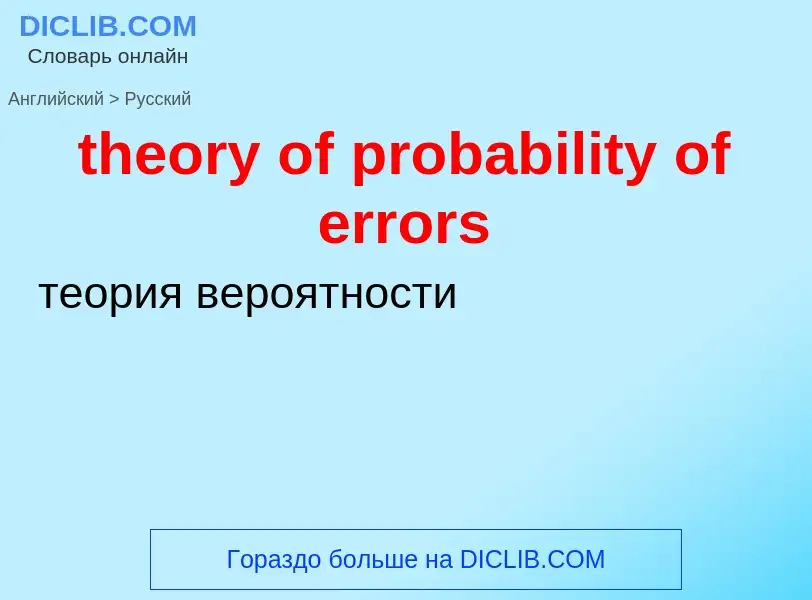Перевод и анализ слов искусственным интеллектом ChatGPT
На этой странице Вы можете получить подробный анализ слова или словосочетания, произведенный с помощью лучшей на сегодняшний день технологии искусственного интеллекта:
- как употребляется слово
- частота употребления
- используется оно чаще в устной или письменной речи
- варианты перевода слова
- примеры употребления (несколько фраз с переводом)
- этимология
theory of probability of errors - перевод на русский
[imprɔbə'biliti]
существительное
общая лексика
невероятность
неправдоподобие
невероятность, неправдоподобие
[prɔbəbə'listik]
общая лексика
вероятностный
прилагательное
общая лексика
вероятный, вытекающий из теории вероятностей
существительное
общая лексика
вероятный
вытекающий из теории вероятностей
религия
пробабилистичный
[prɔbə'biliti]
общая лексика
вероятность
вероятностный
правдоподобие
строительное дело
обеспеченность (гидрологической величины)
существительное
общая лексика
вероятность
правдоподобность
правдоподобие
- probability of accepting bad product
- probability of customer loss
- probability of no-arrivals
- probability of rejection
- probability of single survival
- probability of tying
- balking probability
- breakeven probability
- busy-period probability
- estimated probability
- idleness probability
- loss probability
- occupation probability
- parity-specific birth probability
- prior probability
- queue-length probability
- ruin probability
- runout probability
- shortage probability
- specified probability
- steady-state probability
- stockout probability
- survival probability
- winning probability
- zero probability
['prɔbəb(ə)l]
общая лексика
вероятностный
вероятный
возможный
правдоподобный
Смотрите также
прилагательное
общая лексика
вероятный
возможный
правдоподобный
предполагаемый
вероятный, возможный
существительное
['prɔbəb(ə)l]
общая лексика
вероятный выбор
возможный кандидат и т. п.
возможный кандидат, вероятный выбор и т. п.
военное дело
предположительно сбитые самолёты противника
Определение
.
Википедия
Probability theory is the branch of mathematics concerned with probability. Although there are several different probability interpretations, probability theory treats the concept in a rigorous mathematical manner by expressing it through a set of axioms. Typically these axioms formalise probability in terms of a probability space, which assigns a measure taking values between 0 and 1, termed the probability measure, to a set of outcomes called the sample space. Any specified subset of the sample space is called an event. Central subjects in probability theory include discrete and continuous random variables, probability distributions, and stochastic processes (which provide mathematical abstractions of non-deterministic or uncertain processes or measured quantities that may either be single occurrences or evolve over time in a random fashion). Although it is not possible to perfectly predict random events, much can be said about their behavior. Two major results in probability theory describing such behaviour are the law of large numbers and the central limit theorem.
As a mathematical foundation for statistics, probability theory is essential to many human activities that involve quantitative analysis of data. Methods of probability theory also apply to descriptions of complex systems given only partial knowledge of their state, as in statistical mechanics or sequential estimation. A great discovery of twentieth-century physics was the probabilistic nature of physical phenomena at atomic scales, described in quantum mechanics.

![The [[normal distribution]], a continuous probability distribution. The [[normal distribution]], a continuous probability distribution.](https://commons.wikimedia.org/wiki/Special:FilePath/Gaussian distribution 2.jpg?width=200)
